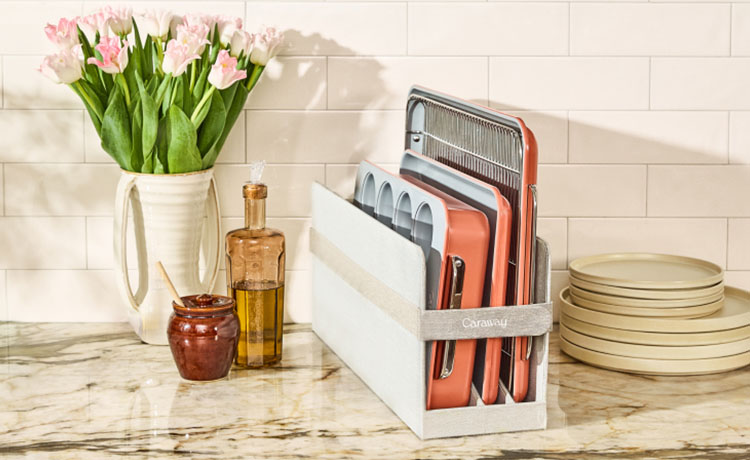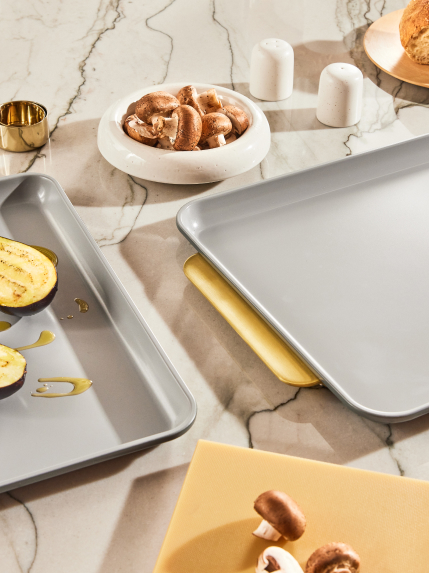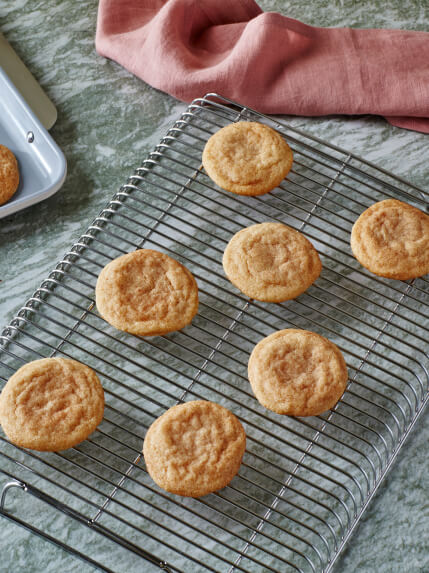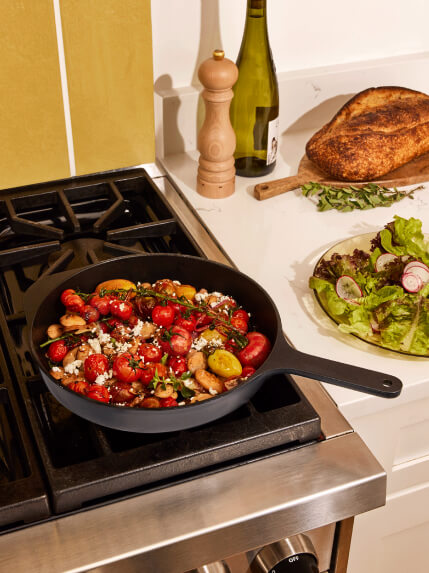You have no items in your cart
Shop our collectionsFree Shipping On Orders $90+
Free Returns
30-Day Trial
Home & Kitchen with Caraway

Baking is both an art and a science, and the right tools can make all the difference. When it comes to creating those perfectly golden cookies or that flawlessly fluffy cake, the material of your bakeware isn’t just a detail—it’s a cornerstone of culinary success.
At Caraway , we understand that choosing the right bakeware material impacts everything from heat distribution to cleanup ease, shaping your baking results and experience. That's why we're committed to guiding you through the maze of options with straightforward advice and top-tier products.
Whether you're a seasoned baker or just starting out, knowing what’s in your bakeware is key to healthier, happier baking. Let's dive into what makes each material unique and discover why some are better suited to your baking needs than others.
When it comes to bakeware material, you’ve got options—a whole kitchen’s worth, actually. Here are seven key factors to consider that'll streamline your choice and seriously boost your baking game:
Even bakes and perfect crusts hinge on how evenly your bakeware spreads heat. Opt for materials known for their stellar heat distribution to avoid the dreaded duo of burnt edges and undercooked centers. This way, whether you’re tackling crusty breads or delicate pastries, you get nothing but uniform yumminess.
Your bakeware should stick around longer than the aroma of fresh cookies. Search for materials that can take the heat—repeatedly—without warping or wearing out. Durable bakeware not only keeps its shape and functionality over time but also consistently delivers those flawless baking results you love.
No one wants a side of chemical reaction with their culinary creations. Choose bakeware that won’t react with acidic or alkaline foods, ensuring the flavors of your ingredients stay true, whether you’re baking tangy citrus tarts or savory tomato pies.
The joy of baking shouldn’t end with a stuck-on mess. Nonstick surfaces make it easy to release your treats without leaving half behind . Look for eco-friendly, naturally slick options like our Baking Sheet Duo that lets you slide those cupcakes right out of the pan and cut down on cleanup time.

Think about how much elbow grease you’re willing to invest in your bakeware. Some materials may demand a bit more TLC, like hand washing or seasoning, while others boast dishwasher-safe tags for effortless cleaning.
Not all bakeware is created equal, especially under high heat. It’s crucial to pick materials that can handle the temperature demands of your recipes, ensuring everything from slow-roasted meats to quick-baked desserts comes out just right.
Last but not least, consider your budget and the availability of the bakeware. From wallet-friendly basics to high-end professional gear, there’s a range to fit every baker’s needs and style. Investing wisely means enhancing your kitchen capabilities without breaking the bank.
We’ve covered why heat distribution matters, but let’s get specific. The materials you choose directly impact how evenly your cookies bake or how perfect your sourdough crust turns out.
Aluminum pans are the unsung heroes of even baking. They’re lightweight, affordable, and excellent at conducting heat, making them a go-to for baking sheets, cookie sheets, and even cake pans.
Their ability to conduct heat quickly means your batter bakes evenly, without hot spots or undercooked centers. If you're after a reliable material that handles everyday baking with ease, aluminum is a no-brainer.
Copper cookware takes heat conductivity to another level. It heats up fast, cools down just as quickly, and ensures unparalleled precision, which is essential for delicate recipes like tarts or cheesecakes.
Copper’s responsiveness makes it perfect for recipes that require exact temperature control. While it’s often an investment, copper is a standout for serious bakers looking to achieve consistent, professional-level results.
Durability matters when you’re buying bakeware that you’ll use for years. Materials like enameled cast iron and stainless steel are built to last, standing up to frequent use, high heat, and temperature changes without breaking a sweat.
Enameled cast iron is practically indestructible. It resists chipping, cracking, and corrosion, making it a staple for hardworking kitchens. Ideal for baking dishes like casseroles or hearty quick breads, it transitions effortlessly from stovetop to oven. The enamel coating adds a layer of protection, making it easier to clean and more versatile than raw cast iron.

Stainless Steel Bakeware is tough, reliable, and made to last. It resists rust, doesn’t warp under high heat, and is perfect for everything from roasting veggies on a sheet pan to baking savory dishes in a loaf pan.
Its non-reactive surface means you can bake with acidic ingredients like tomatoes or citrus without worrying about unwanted flavors or stains. With its durability and versatility, stainless steel is a must-have for any kitchen.
Non-stick bakeware is a lifesaver when it comes to effortless baking and cleanup. From whipping up cupcakes to sliding brownies out of a pan, the right non-stick material makes all the difference. Two standouts in this category are silicone and other advanced non-stick coatings.
Silicone bakeware has earned its place in modern kitchens for good reason. It’s flexible, durable, and naturally non-stick, making it perfect for delicate bakes like tarts, muffins, or even quick breads.
Silicone is also oven-safe, dishwasher-friendly, and great for handling a range of temperatures without losing its shape or effectiveness. Plus, no need for parchment paper—your baked goods pop out with ease every time.
If you prefer more traditional options, advanced coatings are the way to go. Caraway’s naturally slick bakeware, free from PTFE and PFOA , delivers a safe, seamless baking experience.
These coatings ensure even the stickiest recipes release cleanly—think cheesecake or sticky buns—with minimal greasing or cleanup. They’re perfect for baking pans, cookie sheets, or sheet pans, offering both ease and peace of mind.
High-heat baking demands materials that can handle the pressure without warping or cracking. Be it broiling, roasting, or baking at high temperatures, enameled cast iron and stainless steel are your best bets.

Caraway’s enameled cast iron excels in high-heat settings, making it a favorite for recipes that require long, even cooking. From Dutch ovens to baking dishes, it handles temperature extremes effortlessly while maintaining consistent heat distribution.
Its enamel coating prevents corrosion, making it great for saucy dishes or recipes involving acidic foods like tomatoes or citrus.
Stainless steel is a versatile workhorse that thrives under high heat. It resists warping, making it ideal for heavy-duty use with sheet pans, steel pans, or roasting dishes.
Its non-reactive surface ensures that even acidic or heavily seasoned dishes bake beautifully without altering the taste. Whether you're browning meats or baking crusty bread, stainless steel is up for the task.
Choosing the right bakeware materials comes down to finding what works best for your needs, your kitchen, and your commitment to healthier, easier cooking. From the heat conductivity of aluminum to the durability of stainless steel, the flexibility of silicone, and the high-heat resilience of enameled cast iron, every material brings something valuable to the table.
At Caraway , we go beyond just bakeware. Our ceramic-coated, non-toxic cookware is designed with your health and the planet in mind, free from harmful PFOA, PTFE, and other forever chemicals. With sleek, functional designs and surfaces that make cooking and cleaning effortless, our products make healthier cooking a seamless part of your daily life.
Ready to upgrade your kitchen essentials? Explore Caraway’s collection of thoughtfully designed bakeware and cookware and discover how easy it can be to make safer, smarter choices for your home.
Let’s bring joy back into your cooking—without the chemicals.
Sources:
Heat Distribution - an overview | ScienceDirect Topics
What Exactly Is Nonstick Coating? | The Strategist
PFOA, PFOS, and Related PFAS Chemicals | American Cancer Society
What's the Difference Between Reactive and Nonreactive Pans? | Martha Stewart
Free Shipping On Orders $90+
Free Returns
30-Day Trial
Spend $675 more for a free gift!
Caraway & MATE Sweatshirt
Spend $675
Spend $675 more for a free gift!
Exclusive gift with orders $675+
Caraway & MATE Sweatshirt